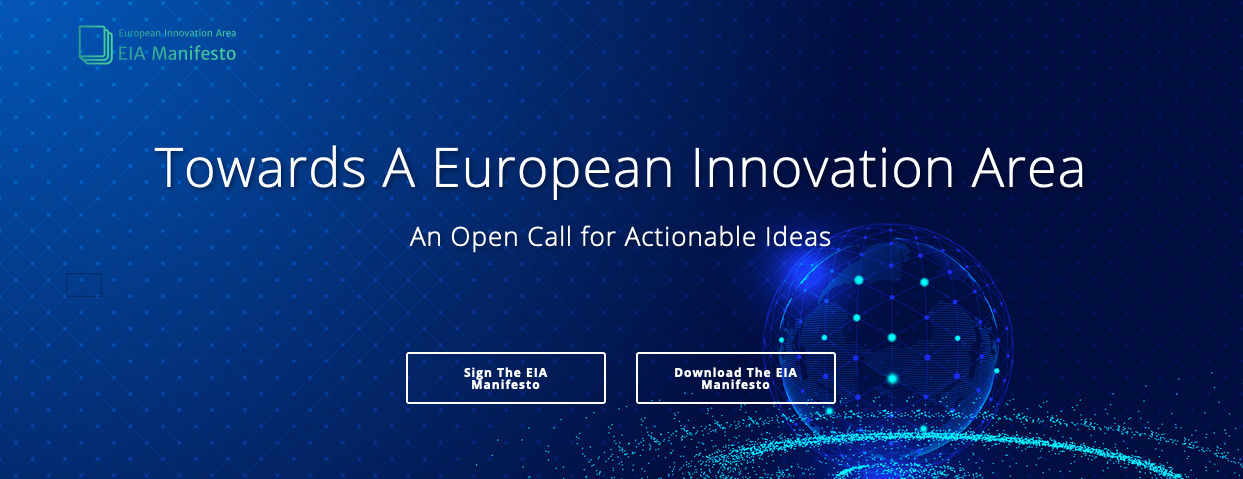We have the pleasure to present the New Innovation Manifesto for a European Innovation Area from our position as a Board Member of The Knowledge4Innovation Forum in the European Parliament. We ensured that the women innovators, women led startups, women investors and women led VCs are inside the manifesto, as well as the action to focus to re-imagine our financial ecosystem for innovation in Europe. At Collabwith, we believe in innovation ecosystems as a power for innovation with collaboration at the heart and also we believe that innovation adoption via innovation procurement is one of the main strategies to create an innovative Europe, where organizations adopt innovation from European startups, and European research results ready to be used. We have to take this opportunity to create impact from knowledge through innovation adoption.
How it works?
- Read the “Innovation Manifesto”
- Sign the “Innovation Manifesto”
- Select your focus area you want to add your idea and action
- Send your proposal
What will it happen?
The Innovation Manifesto will be a guide for all the member states how to invest the recovery fund and the NextGenerationEU funds. Additionally, all the collected ideas and actions will be sent to the European Commission and the Commissioner of Innovation Mariya Gabriel to write the next Innovation Policy. This means, that we have a historic moment where every European can co-create with policy makers the new Innovation policy, and bring new and practical ideas from your perspective and experience to co-create together the new innovation future in Europe.

About The European Innovation Area Manifesto
In July 2019, the K4I Forum presented its 2030 strategy ‘Towards A European Innovation Area’ at the Welcome Reception for New and Returning MEPs. The need for a European Innovation Area has since been discussed on multiple occasions with members of the European Parliament, Commissioner Gabriel, and stakeholders most recently in December 2020 at the 12th European Innovation Summit.
Innovation is key in accelerating the green and digital economy of tomorrow. Now is the time to bolster Europe’s innovation landscape to foster this transition. In order to tap into the full potential of Europe’s knowledge and talent, there must be a cohesive network linking together all innovation actors. To achieve this, it is imperative to establish a robust framework for innovation policy in the EU. The time is now for a European Innovation Area that empowers all innovators and entrepreneurs across the continent to realise their full potential.
Making the European Innovation Area a reality will require the input of all relevant stakeholders, from both the public and private sectors. Our Manifesto outlines the key focus areas for accelerating Europe’s transition toward a single European innovation ecosystem. Together with the K4I Forum Chair, MEP Maria da Graça Carvalho and other K4I Forum political members, EIT KICs, European Partnerships, universities, and innovation support organisations, we present the Manifesto calling for actionable ideas and work with Commissioner Mariya Gabriel to build a powerful European Innovation Area for the benefit of Europe, its citizens, and its enterprises.
Focus Areas
Initially we have identified the following EIA Focus Areas
- Tech Sovereignty
- Green transition
- From Education to Entrepreneurship
- Fostering Innovation Cohesion
- Europe’s Deep Tech Opportunity
- Women-led VCs and Startups
- Regulating Emerging Technologies
- Financing Innovation and New Technologies
Tech Sovereignty
Europe is often heavily reliant on technologies that come from beyond its borders. This dependence represents both an economic loss and a potential security threat. The establishment of the European Innovation Area looks to directly address the underlying causes of this issue. In terms of security, defense, and economic stability, strengthening technological autonomy is essential. Europe must rely on the strength of its broad research institutions and nurture its growing digital infrastructure and economy while ensuring that the continent’s core democratic values still apply in the new green and digital age. The development of a cohesive ecosystem that fosters innovative excellence within the European continent is the answer. In doing so, Europe can position itself as a leader in world-class, socially responsible, and environmentally sustainable tech.
Green Transition
Innovation and new technologies will drive the transformation to a climate neutral recovery. The green transition is one of the main objectives of the NextGenerationEU. Tackling climate change, ocean & forest preservation, responsible consumption, green cities and clean energy production are all indispensable parts of establishing this new and sustainable future. As it stands, Europe is on the edge of a very important transformation. The UN SDGs address all relevant areas where action is urgently needed. However, it is crucial to recognize the economic opportunity represented by a green transition. Businesses for good are actually good for business. Green investments serve to not only address global challenges, but they also provide a great return on investment. Today, there is a steady stream of funds being dedicated to the infrastructure necessary for the 2050 target of climate-neutrality. Funds for bio-agriculture are rapidly increasing and 55% of the world’s new hydrogen projects are now found in Europe. Innovation will only become more purpose driven as the amount of funding dedicated toward sustainable investments continues to increase.
From Education to Entrepreneurship
As we know from Silicon Valley, many of the most successful startups were launched by students that didn’t even finish their studies. Universities provide a fertile ground for creating the entrepreneurs of the future. Leading technical universities across the EU have started putting in place ecosystems with maker spaces & spin-off services in direct cooperation with large companies and investors. These ‘university valleys’ are becoming the main fabric of startups in deep tech areas. Examples include TU Munich, DTU, Hanze UAS and many more. The European Institute of Innovation and Technology (EIT), under the leadership of EIT Raw Materials, has launched the HEI Initiative: Innovation Capacity Building for Higher Education − a new initiative to unlock the full innovation potential of higher education institutions’ (HEIs) by increasing their entrepreneurial and innovation capacity.
Fostering Innovation Cohesion
In the EU there exists a significant territorial diversity of innovation performance among regions, including rural areas, and among the Member States. The gap in innovation performance remains larger than the gap for most other basic economic indicators, such as GDP per capita, employment, and productivity. This divide between lower and higher performing regions not only reduces the EU’s overall R&I potential but also poses a serious threat to economic growth, cohesion, and global competitiveness. The European Innovation Area seeks to address this gap and the various roadblocks that impede scientific and technological performance. By implementing adequate policies in education, research and innovation, the European Union helps underperforming regions to further develop their innovation ecosystem, including the development of startup villages in rural areas, and create the basis for the next wave of disruptive innovators. Fostering innovation cohesion is one way to ensure that all of Europe is able to benefit from the transition to a climate-neutral economy. Europe needs to tap in the full potential of its knowledge, ideas, brains and talent. These assets are abundant across the continent, but do not always find the ways and means to achieve their full potential or desired market. A European Innovation Area will provide consistent and clear direction to increase the effectiveness of the many existing innovation programmes and financial instruments. This will have a positive impact on all regions to ensure that nobody is left behind in the Innovation Economy.
Europe’s Deep Tech Opportunity
If the last twenty years were all about digital technologies, the next twenty years are likely to be all about deep tech. Deep tech is technology based on the most recent engineering innovation and scientific breakthroughs – including Artificial Intelligence, blockchain, smart cities, robotics, and quantum technology. It is defined by its profound enabling power and its potential to catalyze change. In Europe, the deep tech revolution is already well underway. Today, European deep tech companies are valued at over €700B and they account for a quarter of all European venture capital. The engineering innovations that drive these technologies are key to constructing a sustainable and resilient recovery, accelerating the green and digital transitions, and ensuring Europe’s technological sovereignty. Current examples are in the areas of synthetic biology, nuclear fusion, and genomic editing, just to name a few.
Women-led VCs and Startups
According to EIB and EIF studies, 30% of entrepreneurs are women, but they only receive 2% of financing. With the pandemic, this figure has dropped to 1%. Only 4% of VC have a female majority, and only 0.5% of VC are women-led. To put it simply, there needs to be more women investors, more funding for women led VCs, and more investment in women-led startups and entrepreneurs. There are several root causes as to why there is such limited access to finance for women, but certainly there is a great economic and social potential. Women are doing things in a different way, and our financial system hasn’t always been ready to accept this. Fortunately, there are ways to overcome this unacceptable situation and the K4I Forum together with its partners propose a number of ‘actionable ideas.’
Regulating Emerging Technologies
Regulation should incentivize the creation of a level playing field in the area of innovation, ensuring that new and existing technologies work toward the benefit and betterment of society. Innovation and emerging technologies are critical to the growth of the European economy and have long since been the key to maintaining Europe’s competitive edge on the global stage. The role of regulation in the European Innovation Area cannot be understated. It is critical to the success of all stages of the innovation process, from research & development to commercialization. When thoughtfully executed in cooperation with key stakeholders, regulation can serve to encourage cooperation and further stimulate the innovative potential of new technologies. When regulation is too rigid and hampers competition, research & development become less attractive and innovation is slowed.
Financing Innovation and New Technologies
Financing innovation and new technologies: Innovative technologies do not only need human capital, strong supportive ecosystems and a supportive legal framework, they also need capital. Substantial amounts of the EU and national budgets are spent on research and innovation. However, public grants, loans, and guarantees are not enough to master the transition towards future clean industries and stay globally competitive. The private sector has an important role to play. US VC and PE investments are the benchmark and reaching this level will require us to be innovative – such as by matching public funding and private investments, by continuing to grow instruments such as InvestEU, IPCEIs, the EIC Fund, the EIT KICs Funds, and through using the experience of the EIB and EIF. Making money available is one thing, but ensuring access for the best technologies and entrepreneurs is another challenge, especially when it comes to keeping technology leaders and unicorns in Europe. Despite all our efforts, many of them still find more attractive conditions to go public in the US. A European Sovereign Tech Fund, as suggested by the Unicorns’ Group, is certainly a step in the right direction.
ABOUT COLLABWITH
Collabwith is a technology and a service to structure collaboration for innovation. It’s a tool to connect academics-startups-organizations. Because a tool is not enough to transform how you collaborate, here we have created a new methodology, personalized trainings, a new way of communication and a tailored made consulting for you to be more effective and efficient, now.
Grow your business and innovation through smart collaborations with Collabwith innovative and holistic approach to collaboration.
Magazine: https://collabwith.co
CollaborationXInnovation Platform: https://platform.collabwith.co
Do you want to know more? Book a demo with us, Contact us here.
